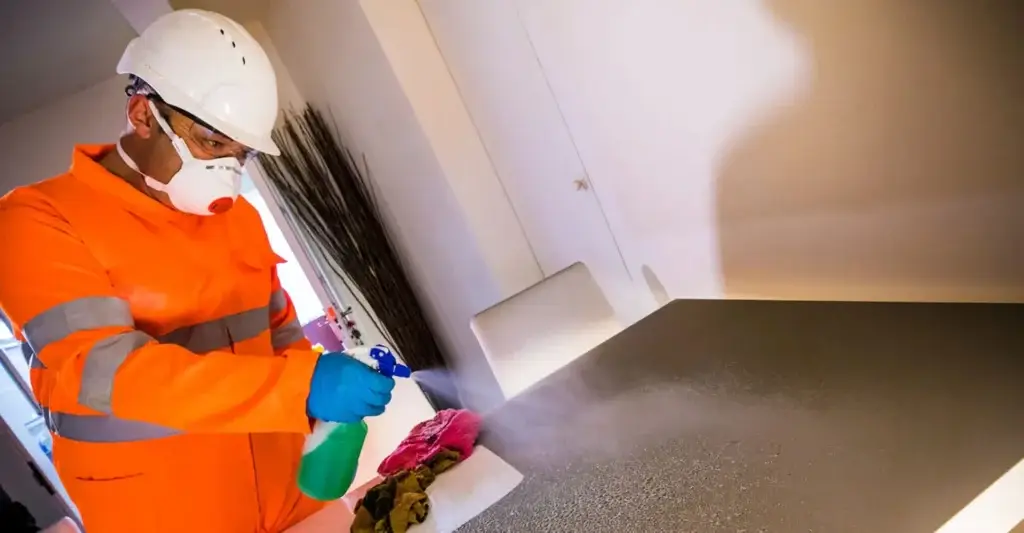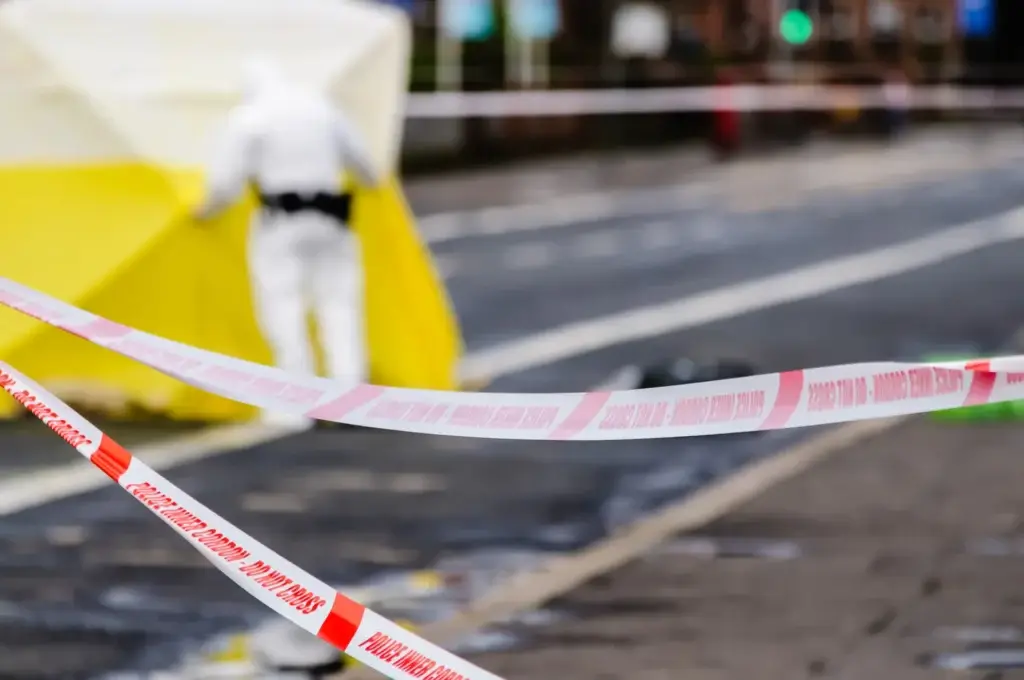This blog by Ideal Response provides UK businesses with a detailed guide on chemical spill cleanup, including legal obligations under COMAH, COSHH, and the Water Resources Act 1991. It covers best practices for compliance, risk management, and engaging professional chemical spill response companies for safe and effective remediation. If you’re short on time and can’t read the entire blog or are looking for more information, visit our chemical spill services to learn more.
Skip to:
Chemical spill cleanup in the UK
Key legal regulations for UK chemical spill cleanup
Chemical spill cleanup in the UK: Compliance essentials for businesses
Chemical spills in commercial and industrial premises can be highly hazardous, costly, and potentially illegal if not managed correctly. Businesses across the UK must comply with strict regulations to protect employees, the environment, and their reputation. Engaging a professional chemical spill cleanup company ensures legal compliance and mitigates risk.
This guide covers the legal requirements for chemical spill management, best practices for compliance, and tips for hiring licensed hazardous waste disposal contractors in the UK.
Key legal regulations for chemical spill cleanup in the UK
- Control of Major Accident Hazards (COMAH) Regulations
COMAH applies to businesses that store or handle large quantities of hazardous substances. Compliance involves:
- Lower Tier: Producing a Major Accident Prevention Policy (MAPP)
- Upper Tier: Providing detailed safety reports to demonstrate all risk mitigation measures
Businesses must ensure chemical spills are prevented and, if they occur, managed to minimise harm to humans and the environment.
- Control of Substances Hazardous to Health (COSHH) Regulations
COSHH mandates that employers assess the risks posed by hazardous substances, implement controls, and train employees. In the event of a chemical spill, swift action is required to protect staff and prevent environmental contamination.
- Water Resources Act 1991
Section 85 prohibits the discharge of polluting substances into controlled waters such as rivers, streams, groundwater, and coastal waters. Failure to comply can result in substantial fines or imprisonment. Businesses must ensure chemical spills do not enter these watercourses.
- Hazardous Waste Regulations
Any waste produced during a chemical spill cleanup must be handled according to hazardous waste regulations. Proper classification, packaging, and transportation to licensed disposal facilities are essential to avoid legal penalties.
Best practices for compliance in commercial settings
Following best practices not only ensures legal compliance but also protects staff, the environment, and the company’s reputation. Ideal Response make sure that all works carried out are done with strict compliance, visit one of our emergency chemical spill case studies to see how we deliver our services.
- Develop a comprehensive spill response plan
- Document step-by-step procedures from detection to final cleanup
- Assign clear roles for staff, including emergency contacts
- Reference relevant UK regulations, including COMAH, COSHH, and the Water Resources Act
- Keep updated emergency contact details for environmental authorities and licensed contractors
- Train employees regularly
- Document step-by-step procedures from detection to final cleanup
- Assign clear roles for staff, including emergency contacts
- Reference relevant UK regulations, including COMAH, COSHH, and the Water Resources Act
- Keep updated emergency contact details for environmental authorities and licensed contractors
- Maintain appropriate spill kits and equipment
- Position spill kits near high-risk areas for quick access
- Include absorbents, neutralisers, PPE, containment booms, and disposal bags
- Inspect kits monthly and replace used or expired items
- For flammable or toxic substances, ensure additional equipment, like fire extinguishers and ventilation systems, is available
- Conduct risk assessments and site audits
- Perform COSHH assessments for each hazardous substance
- Conduct regular audits to detect leaks, hazards, or non-compliance
- Update spill response plans based on audit results or incidents
- Implement proper reporting and monitoring
- Keep detailed logs of every spill, including substance, volume, and actions taken
- Report significant spills, especially those affecting watercourses, to the Environment Agency immediately
- Review incidents internally to prevent recurrence
- Consider environmental monitoring around chemical storage areas to detect contamination early
- Engage Licensed Hazardous Waste and Spill Contractors
- Use only licensed contractors for chemical disposal and remediation
- Maintain consignment notes and waste transfer records for compliance
- Professional contractors offer 24/7 emergency response to minimise downtime and environmental impact
Hire a professional chemical spill cleanup company in the UK
While implementing internal best practices is essential, serious chemical spills should always be handled by licensed chemical spill response companies in the UK. Professional contractors provide:
- 24/7 emergency response for commercial premises
- Full legal compliance with UK environmental regulations
- Safe containment and disposal of hazardous chemicals
- Detailed reporting for inspections and audits
Engaging a hazardous chemical spill contractor ensures swift, safe remediation and reduces the risk of regulatory penalties.
Protect your business with professional chemical spill cleanup services
Chemical spills are high-risk events with potential legal, environmental, and financial consequences. UK businesses must adhere to regulations such as COMAH, COSHH, and the Water Resources Act when managing spills. By following best practices and hiring professional chemical spill cleanup companies, businesses can mitigate risks, protect staff, and ensure regulatory compliance.
Need to speak to a specialist urgently? Call 01622 926 505
Best practice for a chemical spill: Frequently asked questions
Which chemical spill cleanup companies in the UK are licensed?
Only contractors with a hazardous waste carrier licence issued by the Environment Agency are legally permitted to handle, transport, and dispose of chemical spill waste in the UK. When selecting a chemical spill response company, ask for their waste carrier registration number and check it against the official Environment Agency register. Reputable companies will also hold ISO 14001 (environmental management) and ISO 45001 (occupational health & safety) certifications, which demonstrate adherence to industry best practice.
How do I hire a professional chemical spill response company?
Begin by researching UK chemical spill cleanup companies that specialise in commercial and industrial sites. Request evidence of:
- Hazardous waste carrier licensing
- 24/7 emergency response capabilities
- A proven track record in managing chemical spills similar to yours
- Public liability and environmental impairment insurance
- Detailed cleanup and disposal reports for regulatory purposes
- In urgent situations, choose a company with nationwide coverage to ensure rapid deployment and minimal downtime.
What are the costs of commercial chemical spill remediation services in the UK?
The cost can vary significantly based on:
- The size and severity of the spill
- The type and hazard level of the chemical
- The complexity of the site (e.g. confined spaces, watercourse proximity)
- Whether specialist equipment or containment measures are required
- As a general guide, small-scale cleanups may cost several hundred pounds, whereas large-scale industrial incidents can run into the thousands. A professional chemical spill contractor will carry out a site assessment before providing a fixed quotation.
Is it mandatory to report chemical spills in the UK?
Yes. Significant spills, especially those that enter or threaten to enter controlled waters (rivers, canals, groundwater, coastal waters), must be reported immediately to the Environment Agency via the 24/7 incident hotline (0800 807060). Failure to report can lead to substantial fines and prosecution. Even minor spills should be documented internally and may require reporting under COSHH or COMAH if they meet certain thresholds.
Can businesses manage chemical spills in-house?
For small-scale spills that involve low-hazard substances and can be safely contained, trained employees with the correct spill kits and PPE may be able to carry out the cleanup. However, businesses must still ensure waste is disposed of legally and safely.
For medium-to-large incidents or spills involving highly toxic, flammable, or environmentally hazardous chemicals, it is strongly advised to hire a licensed hazardous spill contractor. Professionals have the training, equipment, and legal authorisation to manage these situations without putting staff or the public at risk.
What regulations apply if my chemical spill affects another business or public property?
If a spill migrates beyond your premises and impacts a neighbouring property, public land, or watercourses, you could be held liable under both environmental and civil law. In these cases, immediate action is essential, not only to stop further contamination but also to demonstrate due diligence and potentially mitigate penalties. A professional spill response company can help with containment, remediation, and the provision of evidence for insurance or legal defence.

Andy Garside - Operations Director
Andy brings over 30 years of extensive experience in disaster response and hazardous waste management. With a career deeply rooted in environmental and pollution incident response, Andy possesses thorough technical knowledge of hazardous materials and waste industry operations. Andy ensures the highest standards of safety, compliance, and environmental responsibility across a wide range of complex remediation and decontamination projects. For Andy, operational excellence means not just protecting assets, but also safeguarding public health and the environment, even in the most high-pressure situations.





















